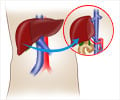Frequently Asked Questions
1. Which doctor should I see for liver biopsy?Your primary care physician can detect liver abnormalities on physical exam and blood tests, and then recommend further tests such as abdominal imaging. If liver disease is suspected or if a liver mass is seen on imaging, then referral to a hepatologist (liver specialist doctor) and hepatobiliary surgeon is appropriate.
2. Are there alternatives to liver biopsy?
Noninvasive assessment of liver disease is becoming increasingly sophisticated, but biopsy remains the gold standard for diagnosis. Elastography (a noninvasive measurement of the physical properties of tissues) can measure the degree of stiffness of the liver, which correlates with fibrosis and cirrhosis. More recent research shows that elastography may also be used to measure the degree of fatty liver disease. Commercially available blood test panels to estimate the degree of fibrosis perform fairly well and are often used to minimize the amount of biopsies performed.
3. What blood tests are done before the Liver biopsy?
This depends on the disease that is being suspected but routine blood and biochemistry tests like a Complete Blood Count, Electrolytes, BUN, Creatinine, Liver function tests, a coagulation profile to include – bleeding time, clotting time, prothrombin time and partial thromboplastin time are done. A routine urine is generally ordered too. Hepatitis A, B or C status is determined by checking for antigen and antibodies status of these viruses.
If the coagulation profile is deranged or platelets are low special precautions are requires including infusion of special blood components before the biopsy.
4. What are the Lifestyle Tips to Keep your ‘Liver Healthy’?
Keep your liver healthy by maintaining a healthy weight, exercising regularly and avoiding excessive amounts of liver toxins such as alcohol or paracetamol.






